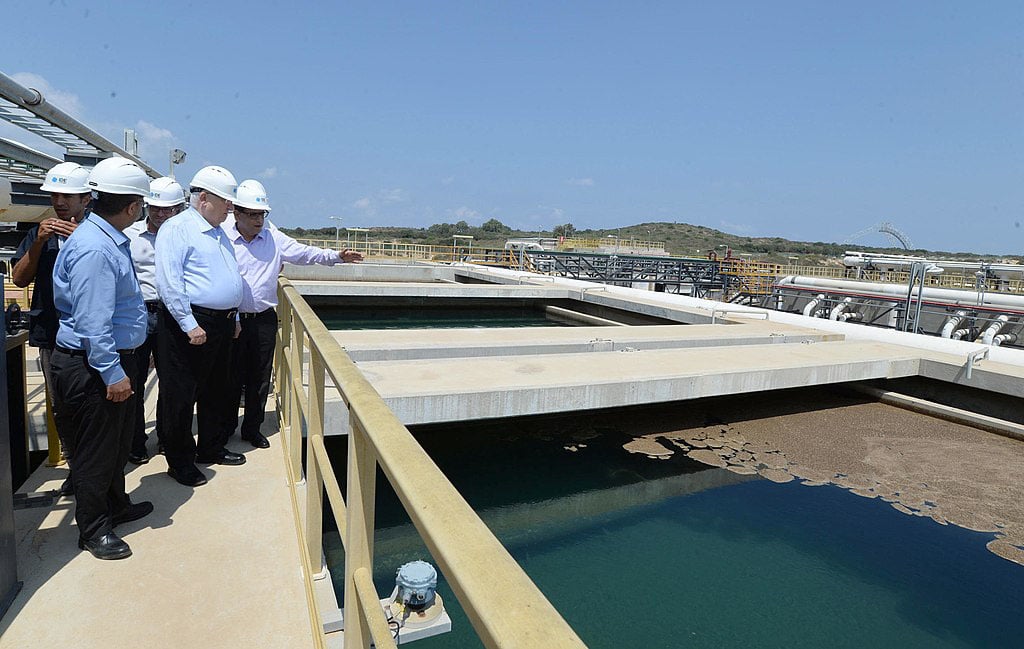 President Reuvin Rivlin visits the Sorek Desalination Plant (Photo from Wikimedia Commons)
President Reuvin Rivlin visits the Sorek Desalination Plant (Photo from Wikimedia Commons) The Friends of European Leadership Network (FELNET), a pro-Israel non-governmental organization, held a webinar on December 21 discussing how Israel has become a reliable source of water in the Middle East and addressing the water issues surrounding other countries in the region.
Seth Siegel, author of the 2015 book “Let There Be Water: Israel’s Solution for a Water-Starved World,” said that since the 1920s, Israel has been focused on water as one of three the most important issues that they knew would affect their destiny. Israel has various methods to cultivate water — including desalination and irrigation — and today, the Jewish state is the main source of water in the Middle East. In fact, 60% of water in the West Bank and 15% in the Gaza Strip come from Israel, according to Siegel, and Israel is one of the few countries in the world that doesn’t subsidize water.
“Israel has always focused on this,” Siegel said.
By contrast, Egypt has been struggling with its water despite having 50 times more water than Israel due to the Nile River, according to Siegel. “It’s a complete and total mess,” Siegel said, pointing out that Egypt’s groundwater is contaminated and not shepherded properly. Israel has been urging Egypt to “make use of smart Israeli technology and change their farming structure,” Siegel said.
The only other country that is more inefficient with their water than Egypt is Iran, which Siegel described as a “self-inflicted wound.” Iran’s Islamic Revolutionary Guard Corps (IRGC) has enriched itself through various engineering projects, including the diversion of rivers and runways. The IRGC has done this so they can “give the favored few access to more water for more irrigation,” Siegel said.
Additionally, Iran has been so focused on utilizing their resources toward building nuclear weapons and developing ballistic missiles that they have ignored the need for more wastewater plants in the country. Consequently, “Tehran is sitting on a river on a lake of untreated sewage,” Siegel said, adding that “people are getting sick from drinking regular tap water… Iran has deprioritized water with massive consequences for the country.”
Siegel warned that “the Islamic world is going to suffer greatly in the coming half century” since “nearly all of them are facing severe water crises.” He also warned that a dearth of water will eventually cause people to uproot their families from the sub-Saharan region in Africa and seek refuge in Europe. Siegel estimates that there could be as many as 60 million refugees from that region of Africa coming in waves to Europe in the coming decades. Given how the migration millions of refugees from Syria in 2015 sparked various populist right-wing movements, Siegel said he couldn’t even begin to “imagine how destabilizing it will be on a humanitarian level” if 60 million African refugees attempt to migrate to Europe.
“This is a crisis in the making that can be stopped today,” Siegel said, pointing out that water issues can take decades before becoming catastrophic.
“This is a crisis in the making that can be stopped today.” — Seth Siegel
Siegel also dismissed accusations that Israel steals water from the Palestinians on the call. “Throughout periods of drought, Israel has always honored its commitment to the Palestinians,” Siegel noted, adding that Israel agreed to allocate water to the Palestinians under the 1993 Oslo Accords.
Siegel also pointed out that the recent Abraham Accords all highlight water from Israel and that Israeli Prime Minister Benjamin Netanyahu gave Indian Prime Minister Narendra Modi a copy of Siegel’s book in a recent trip to Israel, which Siegel argued “was a statement of how Israel can work in harmony with many other countries on how to fix their water problems.”
“There’s going to be a significant role for Israel in helping these countries,” Siegel added, pointing out that Israel “stands now with stride in two regions as a leader in both.”























 More news and opinions than at a Shabbat dinner, right in your inbox.
More news and opinions than at a Shabbat dinner, right in your inbox.